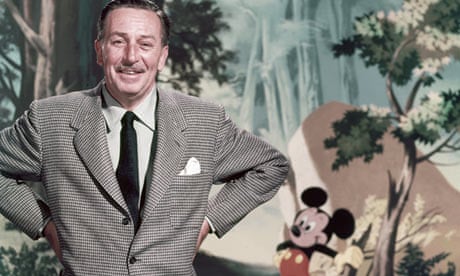A British-designed and directed opera about Walt Disney which premieres in Spain this month before coming to London has been forced to tell the great cartoonist's story without any of the images of the characters that made him a household name. Minnie, Donald, Pluto and Goofy, not to mention Mickey Mouse himself, will not be appearing on stage with the singers.
The Perfect American, the latest work by the acclaimed composer Philip Glass, concentrates on the last years of Disney's life, when he lay dying of lung cancer while planning to have his body frozen. It portrays Disney as a megalomaniac with McCarthyite, racist and misogynist tendencies, so it is clear why the global entertainment corporation has denied rights. Yet, ironically, the most damaging charge the new opera levels at a man whose vision continues to dominate children's culture is probably the claim that he did little actual work on the drawings that made him famous.
"This opera is a surreal dream," said John Berry, artistic director of English National Opera. "It is not a biography and the truth is that we would probably not have used the real Disney characters in the production even if we had been allowed to."
Berry said that Improbable, the acclaimed British ensemble who have created the piece for the Coliseum and for the Teatro-Real in Madrid, have worked on the opera in their unique way and have felt no visual limitations.
"They will be using animal imagery, puppets and shadow plays performed behind a screen to create a sort of abstract world. That is why we felt this is the right story to tell in an opera. It is not a realistic vision," he said.
Improbable also worked with Glass on his 1979 opera Satyagraha, based on the life of Mahatma Gandhi, for a highly praised and innovative 2007 production performed by English National Opera.
The new opera is based on a fictionalised account of working at Disney's cartoon factory written by Peter Stephan Jungk in 2005. His book tells the story from the perspective of a disgruntled employee who is sacked by Disney for trying to start a union and who then resolves to confront the man who has ruined his life and taken credit for the talents of many others.
Teatro-Real's opera director, Gerard Mortier, first commissioned Glass to write the controversial work for the New York City Opera, although the production did not go ahead. Mortier felt Glass was initially daunted by the idea of tackling such a beloved fellow American. "He feared the Disney factory," he has said.
"When I started out, people thought I was going to laugh at him," Glass has said recently. "But I see Walt Disney as an icon of modernity, a man able to build bridges between highbrow culture and popular culture; just like Leonard Bernstein, who could jump from a Broadway musical to a Mahler cycle."
Walt Disney Studios called Glass to dissuade him, but by then the composer was committed. Glass asked librettist Rudy Wurlitzer to turn the book into an opera and the work was duly sent to Disney Studios for consideration. There was no response and Jungk, the original author, interpreted this as "a green light".
"Neither the ENO nor the director, Phelim McDermott of Improbable, have felt any sort of dark presence looming over us as we worked on this," said Berry. "We have created a great poster that will be used in Spain and London and which you have got to look at quite deeply to understand what it means."
In a key early scene, Disney is tended by a nurse he calls Snow White, when his family visit together with the directors of the Disney Company. The dying mogul makes them all take a solemn promise on the American flag never to say the word "die". In later scenes Disney compares himself to Henry Ford, Thomas Edison and Abraham Lincoln and says he is convinced that Ronald Reagan will become president if he will follow his advice.
Jungk's book does not flatter Disney or his vengeful employee, Wilhelm Dantine, and the opera follows the same path. Jungk describes the day that Disney hired the fictional Dantine as the happiest in Dantine's life, but his book then charts his obsessive and thankless efforts to win the praise of his boss.
While Disney fails to undertake any visible writing, drawing or filming, Dantine has to produce thousands of drawings for Sleeping Beauty. In this version of cartoon history, the head of the Disney empire merely gives out vague instructions to his staff, peppered with mean criticisms. According to Jungk's book, Disney could not even write out his own famous signature. Yet in the new opera, as in the book, although the portrait of Disney is clearly unappealing the artists who work for him still show devotion and Old Walt finally emerges as a tragically flawed creative genius.
The Perfect American is the 24th opera from Glass, who has described Disney as the man responsible for "perhaps the most pervasive fantasy world on our planet" and his story as "gripping".
"But, on the face of it, how could it be anything else? The pulse of his life has to be the pulse of our own American culture. And, like other aspects of life here, it is unimaginable, alarming and truly frightening."
